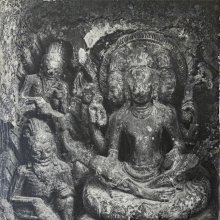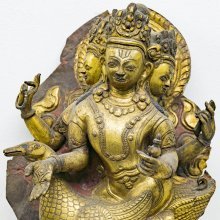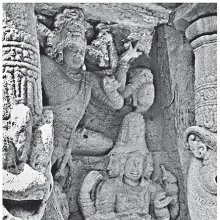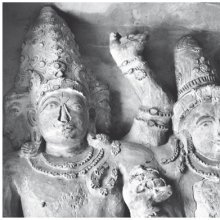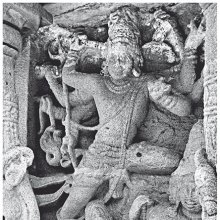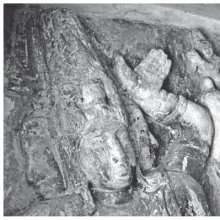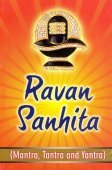Brahma, Brahmā, Brāhma: 68 definitions
Introduction:
Brahma means something in Buddhism, Pali, Hinduism, Sanskrit, Jainism, Prakrit, the history of ancient India, Marathi, Hindi. If you want to know the exact meaning, history, etymology or English translation of this term then check out the descriptions on this page. Add your comment or reference to a book if you want to contribute to this summary article.
Brahma has 68 English definitions available.
Images (photo gallery)
(+53 more images available)
Languages of India and abroad
Sanskrit dictionary
[Deutsch Wörterbuch]
Source: Cologne Digital Sanskrit Dictionaries: Böhtlingk and Roth Grosses Petersburger WörterbuchBrahma (ब्रह्म):—= brahman am Ende einiger compp. [Vopadeva’s Grammatik 6, 44.] asurabrahmau [Weber’s Indische Studien 3, 462, 3.] n. : brahmametu mām, madhumetu mām, brahmameva madhumetu mām [Taittirīyāraṇyaka 10, 38.] brahmaṃ tvamasi viśvadhṛt [80.]
--- OR ---
Brāhma (ब्राह्म):—
--- OR ---
Brahma (ब्रह्म):—n. = 1. brahman
6) [Rāmāyaṇa 7, 109, 4.] — Vgl. mahā .
--- OR ---
Brāhma (ब्राह्म):—
1) śīlam des Brahmanen Wesen [Kathāsaritsāgara 66, 16.] —
2) patron. das Ūrdhvanābhan und Rakṣohan [Ṛgveda] [Anukramaṇikā]
Source: Cologne Digital Sanskrit Dictionaries: Sanskrit-Wörterbuch in kürzerer FassungBrahma (ब्रह्म):——
1) m. Priester in asurabrahma. —
2) n. metrisch für brahman der unpersönlich gedachte Gott [Rāmāyaṇa 7,109,4.] Dagegen ist brahmam Nomin. [Taittirīyāraṇyaka 10,48] (vgl. Comm. zu [Viṣṇupurāṇa 3,15,1]) fehlerhaft, wie auch das darauf folgende madhum Nomin.
--- OR ---
Brāhma (ब्राह्म):——
1) Adj. (f. ī) heilig , göttlich ; auf das — , auf den Brahman — , auf die Brahmanen bezüglich , ihnen gehörig , — eigen , — günstig , aus ihnen bestehend u.s.w. tīrtha n. ein best. Theil der Hand. —
2) m. Patron. undNomen proprium verschiedener Männer. —
3) (f. ī) — a) Brahman’s Energie , eine der acht göttlichen Mütter. Pl. in Skanda’s Gefolge , — b) Rede , Erzählung , die Göttin der Rede , Sarasvatī. — c) eine best. Mūrkhanā [Saṃgitasārasaṃgraha 30.] — d) Beiname der Durgā. — e) heilige — , fromme Weise. — f) eine nach Brahman-Weise verheirathete Frau [Gautama's Dharmaśāstra] [Viṣṇusūtra 24,29.] — g) die Frau eines Brahmane. — h) das Mondhaus Rohiṇī — i) Fischweibchen. — k) eine Ameisenart. — l) Bez. verschiedener Pflanzen. Nach den Lexicographen Clerodendrum siphonanthus , Ruta graveolens ([Rājan 5,61.]) Enhydra Hingcha , Yamswurzel und = somavallī [Dhanvantari's Wörterbuch 3,38.] — m) eine Art Messing. — n) Nomen proprium eines Flusses. —
4) n. das Studium der heiligen Schrift.
Sanskrit, also spelled संस्कृतम् (saṃskṛtam), is an ancient language of India commonly seen as the grandmother of the Indo-European language family (even English!). Closely allied with Prakrit and Pali, Sanskrit is more exhaustive in both grammar and terms and has the most extensive collection of literature in the world, greatly surpassing its sister-languages Greek and Latin.
See also (Relevant definitions)
Starts with (+1197): Brahma Cariya, Brahma dande, Brahma dandi, Brahma dhandu, Brahma kamal, Brahma Kayika Deva, Brahma Loka, Brahma malika, Brahma Mudra, Brahma Practice, Brahma rakshasani, Brahma Samyutta, Brahma vriksha, Brahma World, Brahma-dundi, Brahma-kamal, Brahma-kshatriya, Brahma-maharaja, Brahma-medha, Brahma-muhurta.
Ends with (+29): Abrahma, Adhibrahma, Adibrahma, Aggibrahma, Annabrahma, Aparabrahma, Aryabrahma, Asurabrahma, Athokaparabrahma, Atibrahma, Avantibrahma, Bakabrahma, Brihadbrahma, Dakshabrahma, Darubrahma, Haribrahman, Highest brahma, Indrabrahma, Karanabrahma, Khedbrahma.
Full-text (+9614): Brahmaloka, Brahmapalasha, Brahmadanda, Brahmadeya, Kalpa, Prajapati, Brahmapurana, Brahmastra, Caturmukha, Pulaha, Satyaloka, Brahmasayujya, Brahmadana, Brahmatva, Marici, Brahmaratri, Brahmalaukika, Brahmavivaha, Brahmasutra, Pulastya.
Relevant text
Search found 396 books and stories containing Brahma, Brahmā, Brāhma; (plurals include: Brahmas, Brahmās, Brāhmas). You can also click to the full overview containing English textual excerpts. Below are direct links for the most relevant articles:
Śrī Kṛṣṇa-vijaya (by Śrī Gunaraja Khan)
Chapter 10 - Brahmā's Prayers (Lalita-rāga)
Chapter 4 - Prayers by the Demigods to Lord Kṛṣṇa in the Womb (Śri-rāga)
Chapter 7 - The Brāhmanas' Wives Offer Prayers to Lord Kṛṣṇa (Mallāra-rāga)
Manusmriti with the Commentary of Medhatithi (by Ganganatha Jha)
Verse 7.2 < [Section I - Important Position of the King (rājan)]
Verse 2.59 < [Section XIII - Initiation (upanayana)]
Verse 2.58 < [Section XIII - Initiation (upanayana)]
Rig Veda (translation and commentary) (by H. H. Wilson)
The Markandeya Purana (Study) (by Chandamita Bhattacharya)
1.5: Divisions of the Purāṇas < [Chapter 1]
2. Worship and Mythology of Brahmā < [Chapter 3]
1.6: Number of Purāṇa < [Chapter 1]
Maha Prajnaparamita Sastra (by Gelongma Karma Migme Chödrön)
I. Definition of the four fearlessnesses in the Vaiśāradyasūtra < [Part 1 - The four fearlessnesses of the Buddha according to the Abhidharma]
Appendix 5 - Definition of Brahmacarya and Brahmacakra < [Chapter XIV - Emission of rays]
Act 7.2: Description of the Śuddhavāsika and Brahmaloka gods < [Chapter XIV - Emission of rays]
The Great Chronicle of Buddhas (by Ven. Mingun Sayadaw)
The Occasion of the Great Assembly (Mahāsamaya) < [Chapter 22 - Founding of Vesali]
Expounding of Parosahassa Jātaka < [Chapter 25 - The Buddha’s Seventh Vassa]
Part 2 - Buddha descends from Tāvatiṃsa to Sankassa < [Chapter 25 - The Buddha’s Seventh Vassa]
Related products
(+15 more products available)
